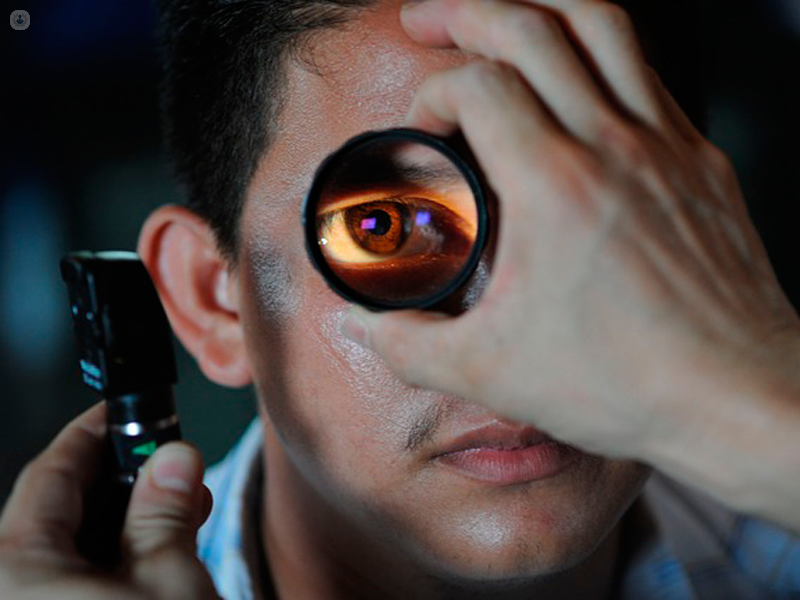What is it?
Neuro-ophthalmology is a field of medicine which studies and treats diseases of the nervous system that affect the visual system. This includes analysing ocular motility, the functionality of cranial nerves and of all the other nervous structures coordinating eye movement, which are integrated with other sensory systems.
Neuro-ophthalmology is a clinical and scientific subspecialty vital in identifying neurological conditions or systemic diseases.

What conditions does neuro-ophthalmology treat?
Neuro-ophthalmology can treat and diagnose several conditions, including:
- Eyelid twitching and some types of adult strabismus
- Optic nerve tumour
- Cranial nerves palsy, gaze palsy and oculomotor nerve palsy
- Pupillary abnormalities, myopathy and ocular myasthenia gravis
- Hereditary retinal dystrophies and inflammatory optic neuropathies, be it or dysimmune or associated with multiple sclerosis (MS)
There are several neuro-ophthalmology conditions which can affect the eyes such as:
- diabetes
- glaucoma
- multiple sclerosis
- cardiovascular disease
- infectious diseases
What symptoms can be traced back to a neuro-ophthalmologic condition?
The symptoms vary according to the condition you may be suffering from. However, the main and most common symptoms are:
- functional visual loss;
- diplopia (double vision);
- headache;
- ptosis (drooping eyelids);
- exophthalmos (bulging eyes), and;
- pain.

What can cause neuro-ophthalmology conditions?
There are various causes of neuro-ophthalmology conditions. These include:
Infections
Inflammation of the optic nerve can occur because of bacterial and viral infections, such as Lyme disease, measles, mumps and some sexually-transmitted diseases.
Traumatic brain injury
Temporary or permanent vision loss can occur because of concussions and other injuries to the brain and head.
Cardiovascular disease
Vision problems can be caused by blood clots, plaque and other blood vessel issues.
Medications
Neuro-ophthalmologic symptoms can develop as a result of use of some antibiotics and quinine.
Autoimmune disease
Optic neuritis and other neuro-ophthalmic conditions are related to multiple sclerosis (MS) and lupus myasthenia gravis.
What neuro-ophthalmology tests can you take?
Neuro-ophthalmologic conditions can be diagnosed by using tools and techniques such as a visual field test, optical coherence tomography (OCT) for looking at the cornea and retina, or an optical electrophysiology test.
Usually these tests can be done at an outpatient clinic: you will only need to stay in hospital if you need a complex diagnosis or complex treatment.
What doctor will you see?
The neuro-ophthalmology field is mainly composed of neurologists and ophthalmologists.
07-19-2016 10-11-2023Neuro-ophthalmology
Mr Nadeem Ali - Ophthalmology
Created on: 07-19-2016
Updated on: 10-11-2023
Edited by: Karolyn Judge
What is it?
Neuro-ophthalmology is a field of medicine which studies and treats diseases of the nervous system that affect the visual system. This includes analysing ocular motility, the functionality of cranial nerves and of all the other nervous structures coordinating eye movement, which are integrated with other sensory systems.
Neuro-ophthalmology is a clinical and scientific subspecialty vital in identifying neurological conditions or systemic diseases.

What conditions does neuro-ophthalmology treat?
Neuro-ophthalmology can treat and diagnose several conditions, including:
- Eyelid twitching and some types of adult strabismus
- Optic nerve tumour
- Cranial nerves palsy, gaze palsy and oculomotor nerve palsy
- Pupillary abnormalities, myopathy and ocular myasthenia gravis
- Hereditary retinal dystrophies and inflammatory optic neuropathies, be it or dysimmune or associated with multiple sclerosis (MS)
There are several neuro-ophthalmology conditions which can affect the eyes such as:
- diabetes
- glaucoma
- multiple sclerosis
- cardiovascular disease
- infectious diseases
What symptoms can be traced back to a neuro-ophthalmologic condition?
The symptoms vary according to the condition you may be suffering from. However, the main and most common symptoms are:
- functional visual loss;
- diplopia (double vision);
- headache;
- ptosis (drooping eyelids);
- exophthalmos (bulging eyes), and;
- pain.

What can cause neuro-ophthalmology conditions?
There are various causes of neuro-ophthalmology conditions. These include:
Infections
Inflammation of the optic nerve can occur because of bacterial and viral infections, such as Lyme disease, measles, mumps and some sexually-transmitted diseases.
Traumatic brain injury
Temporary or permanent vision loss can occur because of concussions and other injuries to the brain and head.
Cardiovascular disease
Vision problems can be caused by blood clots, plaque and other blood vessel issues.
Medications
Neuro-ophthalmologic symptoms can develop as a result of use of some antibiotics and quinine.
Autoimmune disease
Optic neuritis and other neuro-ophthalmic conditions are related to multiple sclerosis (MS) and lupus myasthenia gravis.
What neuro-ophthalmology tests can you take?
Neuro-ophthalmologic conditions can be diagnosed by using tools and techniques such as a visual field test, optical coherence tomography (OCT) for looking at the cornea and retina, or an optical electrophysiology test.
Usually these tests can be done at an outpatient clinic: you will only need to stay in hospital if you need a complex diagnosis or complex treatment.
What doctor will you see?
The neuro-ophthalmology field is mainly composed of neurologists and ophthalmologists.


What is cerebral visual impairment and how does it affect children?
By Mr Richard Bowman
2024-11-18
Cerebral visual impairment ( CVI ) are visual problems that arise from the brain (50% of which is used to process vision) rather than the eyes. Mr Richard Bowman, a leading ophthalmic surgeon, explains what CVI is, its characteristics and how it may present. See more
Experts in Neuro-ophthalmology
-
Mr Richard Bowman
OphthalmologyExpert in:
- Paediatric ophthalmology
- Strabismus (squint)
- Neuro-ophthalmology
- Nystagmus
- Cerebral visual impairment (CVI)
-
Dr Anand Trip
NeurologyExpert in:
- Neurological disorders
- Multiple sclerosis
- Headache
- Neuro-ophthalmology
- Dizziness
- Myelitis
-
Mr Christos Moraitis
OphthalmologyExpert in:
- Neuro-ophthalmology
- Paediatric ophthalmology
- Amblyopia
- Myopia
- Optic neuritis
- Diplopia (double vision)
-
Mr Lloyd Bender
OphthalmologyExpert in:
- Paediatric ophthalmology
- Strabismus (squint)
- Neuro-ophthalmology
- Watery eyes
- Amblyopia
- Nystagmus
-
Mr Ayman Khaier
OphthalmologyExpert in:
- Strabismus (squint)
- Cataract surgery
- Neuro-ophthalmology
- Paediatric ophthalmology
- YAG laser capsulotomy
- Blepharitis
- See all

Tunbridge Wells Eye Centre
Tunbridge Wells Eye Centre
7 Vale Ave, Tunbridge Wells TN1 1DJ
No existe teléfono en el centro.
By using the telephone number provided by TOP DOCTORS, you automatically agree to let us use your phone number for statistical and commercial purposes. For further information, read our Privacy Policy
Top Doctors

The Clementine Churchill Hospital - part of Circle Health Group
The Clementine Churchill Hospital - part of Circle Health Group
Sudbury Hill, Harrow HA1 3RX
No existe teléfono en el centro.
By using the telephone number provided by TOP DOCTORS, you automatically agree to let us use your phone number for statistical and commercial purposes. For further information, read our Privacy Policy
Top Doctors

Great Ormond Street Hospital
Great Ormond Street Hospital
Great Ormond Street. WC1N 3JH
No existe teléfono en el centro.
By using the telephone number provided by TOP DOCTORS, you automatically agree to let us use your phone number for statistical and commercial purposes. For further information, read our Privacy Policy
Top Doctors
-
Tunbridge Wells Eye Centre
7 Vale Ave, Tunbridge Wells TN1 1DJ, Tunbridge WellsExpert in:
- Cataracts
- Oculoplastics surgery
- Laser eye surgery
- Refractive surgery
- Facial aesthetics
- Ophthalmology
-
The Clementine Churchill Hospital - part of Circle Health Group
Sudbury Hill, Harrow HA1 3RX, West LondonExpert in:
- Abdominal ultrasound
- Abdominoplasty
- Acne
- Allergies bronchopulmonary
- Allergies nose and ears
- Allergy Dermatitis
-
Great Ormond Street Hospital
Great Ormond Street. WC1N 3JH, Central LondonExpert in:
- Cancer
- Paediatric neurosurgery
- Paediatrics
- See all
- Most viewed diseases, medical tests, and treatments
- Migraine
- Genetic testing
- Minimal access surgery (keyhole surgery)
- Tremor
- Seizures
- Parkinson's disease
- Botulinum toxin (Botox™)
- Abnormal gait
- Peripheral nerve block
- Minimally invasive spinal surgery








